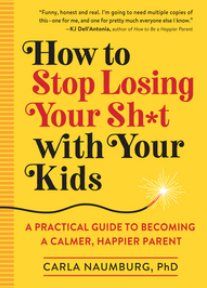12 Steps to Stop Losing It and Improve Parent Anger Management
Have you ever lost it with your kids? As wonderful and rewarding as parenting can be, sometimes it’s downright exhausting and you may find yourself researching in the midst of all the chaos, “how to stop yelling at my kids.” Luckily you can take steps to diffuse negativity and work on your parent anger management skills. Carla Naumburg, PhD and author of How to Stop Losing Your Sh*t with Your Kids teaches you how to stop yelling at your kids, how to be more patient, control your anger in the heat of the moment, and the power found in taking a deep breath and staying calm in the most hectic of situations. Here she shares a few of the tips and tricks that frustrated parents can use when they are on the verge of a breakdown in an excerpt from her book.
* * * *
As soon as you wake up and realize that you’re anywhere in the midst of losing it, just pause for as long as you need to come up with something else. As long as it’s something you want to be practicing and it doesn’t trigger you further, you’re good to go. However, it can be hard to come up with new ideas in a moment of crisis, so here are some suggestions to consider; feel free to use them or come up with your own.
- Breathe. I know I’m being a bit naggy about this whole breathing thing, but it really does work. Also, you can’t breathe and scream at the same time, so that’s cool.
- Step away. As long as the child is somewhere safe, you can walk away. Even if she’s throwing a massive tantrum, better that you take some space than get in her face. Remember that night when I put my girls in front of the TV because that was the only thing I could think to do instead of yelling at them? Well, that worked too. Do the best you can with what you have, and do what you can to get some space when you need it.
- Stay silent. If you’re fairly certain that nothing good is going to come out of your mouth, well, then, shut it. If you really can’t control yourself, put your hand over your mouth. At least then your angry words will be muffled, which isn’t nearly as toxic sounding.
- Simplify your thoughts. Whenever you notice that your brain is full of irritable thoughts about your kids or parenting partner or whomever, do what you can to get some space from them. Simplifying your thoughts will help you calm down.
- Stretch or move. Your nervous system is all amped up and ready for action, so why not jump into action, literally? Do some jumping jacks. Hop on one foot. Get your downward dog on. Walk up and down the stairs twenty-seven times. Now that my girls are older, I’ve been known to run around the outside of the house and come back in. (I tell them that I need some fresh air to calm down and that I’ll be right back and they had better not follow me if they know what’s good for them.)
- Put your hands flat on the counter or feel your feet on the floor. Putting your skin in contact with a hard surface can help you feel more grounded and calm.
- Talk it out, but not too much. Telling your kids what’s about to happen is a great way to diffuse the tension. Try something like, “I’m feeling pretty stressed, and I’m about to snap at you. I need to calm down. You can breathe quietly with me, but if you nag or whine at me, I will probably bite your head off.” (You’re welcome to use my exact words, in which case you may want to explain to your kids that you won’t literally bite their heads off. I made that mistake once and it totally freaked them out.) Again, you’re not going to undermine yourself; you’re actually modeling a behavior that would be great for them to utilize sometime.
- Repeat your safe word (some people call it a mantra). Some folks get their mantras from a guru or other spiritual guide, but you can also just pick one that you like. It doesn’t matter what the word is, or if it’s even a real word, or where it comes from, as long as it helps you calm down and doesn’t trigger you further. For example, you could choose “Let It Go” or “Hakuna Matata” unless anything Disney related makes your blood boil. (My current mantra is “Shama Lama Ding Dong,” from the Otis Day and the Knights song in Animal House.)
- Turn on some tunes and shake your groove thing. Sing really freaking loud if you have to.
- Get silly. Unfortunately, humor is one of the most underutilized tricks up our parenting sleeves, perhaps because some folks are worried about undermining their own authority. This isn’t going to happen. Instead, you’ll be modeling an effective response to difficult moments. You might even crack your kids up, which could help you reconnect more quickly. So, go ahead. Crack a joke. Make a face. Strike a pose. Sing a terrible aria. Wiggle like a worm. I frequently open my mouth to shout and end up squeaking or singing or babbling nonsense or throwing my hands in the air like I just don’t care. If I really need to yell, “AY, CARAMBA” works well, except it often reminds me that my daughters have never watched The Simpsons, which strikes me as a major parenting fail. Sigh.
One note about humor as an Anything Else strategy: Be careful with sarcasm. This is not the time to mock, tease, needle, or generally poke fun at your kids. Those sorts of reactions are often misunderstood in tense moments, and are likely to make things worse.
- Send a little love your way. Cut yourself some slack and practice some self-compassion. Remind yourself that parenting is hard and that it’s OK that it’s hard. Remember that you’re not the only parent to lose their shit at their kids, and that you don’t have to be perfect.
- Make a list of your favorite Anything Else strategies. Put the list on the fridge or the bathroom mirror or the dashboard of your car or write it backward and tape it to your forehead. This will be helpful when you are just aware enough to notice that you’re losing it, but your grip on reality is too tenuous to remember all of the things you could be doing instead.
Notice, Pause, and Do Literally Anything Else. That’s all it takes to not lose your shit with your kids. It’s simple, but not easy. Fortunately, it gets way easier with practice. And you must keep practicing. Don’t give up if you feel like it doesn’t work the first two or twelve times you try. It’s like learning to walk or speak a new language. Falling on your face and stumbling over your words are part of the process, not a reason to give up.
Even so, shit will still be lost. It will happen. It will happen less often and less intensely, but it will happen. This is such a common dynamic that parenting experts have come up with a handy little phrase for it: Rupture, Repair, Repeat. How you handle the aftermath of an explosion has a lot to do with how likely you will be to repeat it. You can emerge from your meltdown fully triggered, buttons ready to be pushed, or you can come out the other side significantly chiller and way less likely to lose it again. Chill is good, so let’s focus on that.
More About How to Stop Losing Your Sh*t with Your Kids:
 Stop the yelling, lose the guilt, and become a calmer, happier parent.
Stop the yelling, lose the guilt, and become a calmer, happier parent.
Drawing on evidence-based practices, here is an insight-packed and tip-filled plan for how to stop the parental meltdowns. Its compassionate, pragmatic approach will help readers feel less ashamed and more empowered to get their, ahem, act together instead of losing it.
Buy the Book
Amazon | B&N | Indiebound | Workman





1 Comment
richardmia92
November 18, 2019 at 1:40 pmvery helpful post and thank you so much for sharing such a nice points.